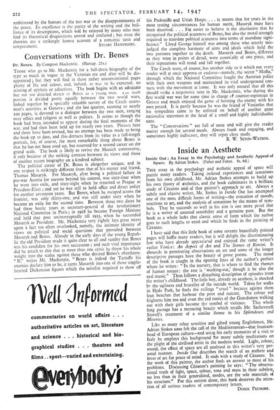Conversations with Dr. Benes
THOSE who go to Mr. Mackenzie for a full-dress biography of the type so much in vogue in the Victorian era and after will be dis-
appointed; but they will find in these rather unconventional pages plenty of life and colour, and, indeed, as was to be expected, no stinting of epithets or adjectives. The book begins with an adequate
but not too detailed sketch ot Benes as a young man. Inc main
portion is divided pretty equally between the two world wars, linked together by a specially valuable survey of the Czech states- man's activities at Geneva ; and the last quarter, running to nearly too pages, is devoted to a dialogue between the two men, ranging over ethics and religion as well as politics. It seems as though the book had been intended to appear during the final moments of the war, and had then been held up for nearly two years. Phrases here and there have been revised, but no attempt has been made to bring the book up to date, and this detracts from its value as a full-length portrait, for, of course, the most remarkable thing about Benes is that he has not been used up, but reserved for a second career on the grand scale. The book is likely to revive the Munich controversy, if only because of the striking contrast between its views and those_ of another recent biography on a kindred subject.
The political career of Dr. Benes is altogether unique, and in one respect is strikingly different from that of his master and friend, Thomas Masaryk. For Masaryk, after being a political failure in pre-war Austria for reasons beyond his control, was sixty-four when he went into exile, and sixty-eight when he returned to Prague as President-Elect ; and yet he was still to hold office and direct policy for another seventeen years. But Benes, when he escaped across the frontier, was only thirty-one, and was still under sixty when he became an exile for the second time. Between those two dates he had three hectic years as secretary-general of the revolutionary National Committee in Paris ; in 1918 he became Foreign Minister and held that post uninterruptedly till 1935, when he succeeded Masaryk as President. Mr. Mackenzie very rightly lays great stress upon a fact too often overlooked, namely, the intimate identity of views on political and social questions that prevailed between Masaryk and Benes. Already in the early days of the young Repub- lic the old President made it quite clear to all and sundry that Benes
was his candidate for his own succession ; and such vital importance did he attach to this that at more than one crisis he threw his whole weight into the scales against those who desired Benes's oVerthrow. "If," writes Mr. Mackenzie, "Benes is indeed the Tartuffe his enemies declare him to be, it turns Masaryk into one of those simple- hearted Dickensian figures which the novelist required to show off
his Pecksniffs and Uriah Heeps. . It means that for years in the most testing circumstances for human merit, Masaryk must have been deceived. . . . Fa l easier to believe is the alternative that he recognised the political acuteness of Benes, but also the moral strength required to translate political acuteness into terms of mundane signi- ficance." Lloyd George himself was among those who utterly mis- judged the complete harmony of aims and ideals which held the two partners together to the death. Masaryk and Benes, different as they were in points of detail, were essentially of one piece, and their reputations will stand and fall together.
The Czech story, of course, has another side to it which not every reader will at once approve or endorse—namely, the secret " Maffia," through which the National Committee fought the Austrian police with their own weapons and maintained its vital underground con- tacts with the movement at home. It was only natural that all this should strike a responsive note in Mr. Mackenzie, who during the first world war was for some time in charge of counter-espionage in Greece and much enjoyed the game of hoisting the enemy with his
own petard. It is partly because he was the friend of Venizelos that his sympathies came to be enlisted on behalf of another great nationalist statesman at the head of a small and highly individualist state.
The " Conversations " are full of meat and will give the reader matter enough for several meals. Always frank and engaging, and - sometimes highly indiscreet, they will repay close study.
R. W. SETON-WATSON.


































 Previous page
Previous page